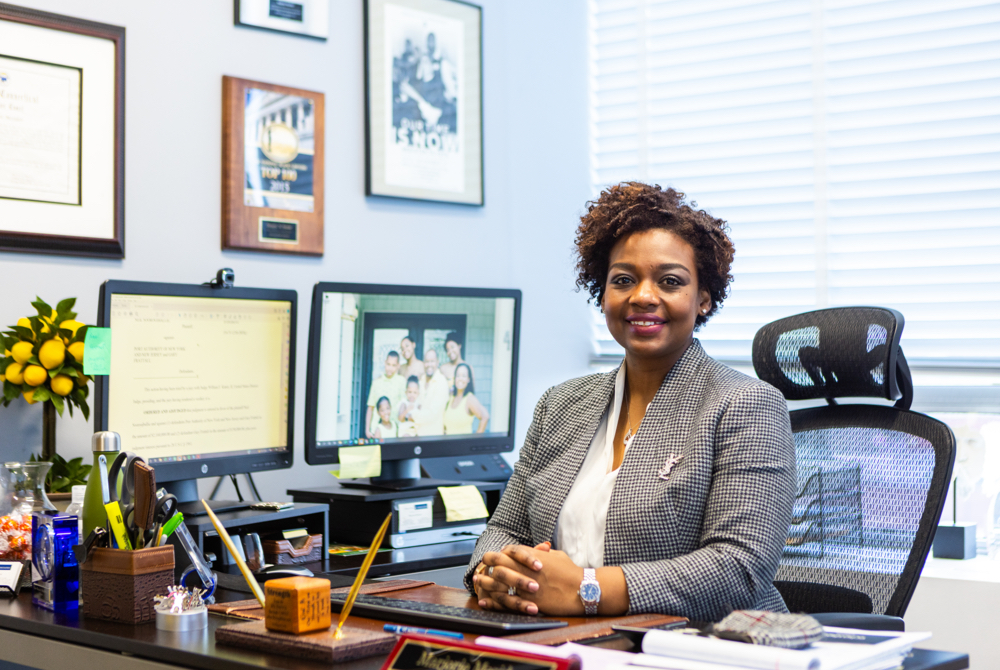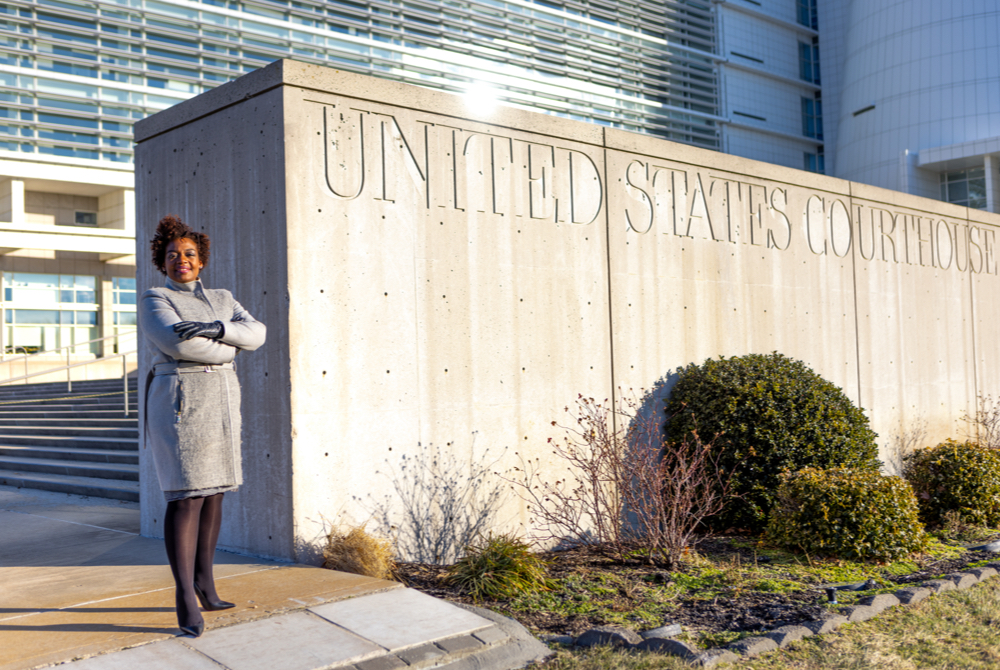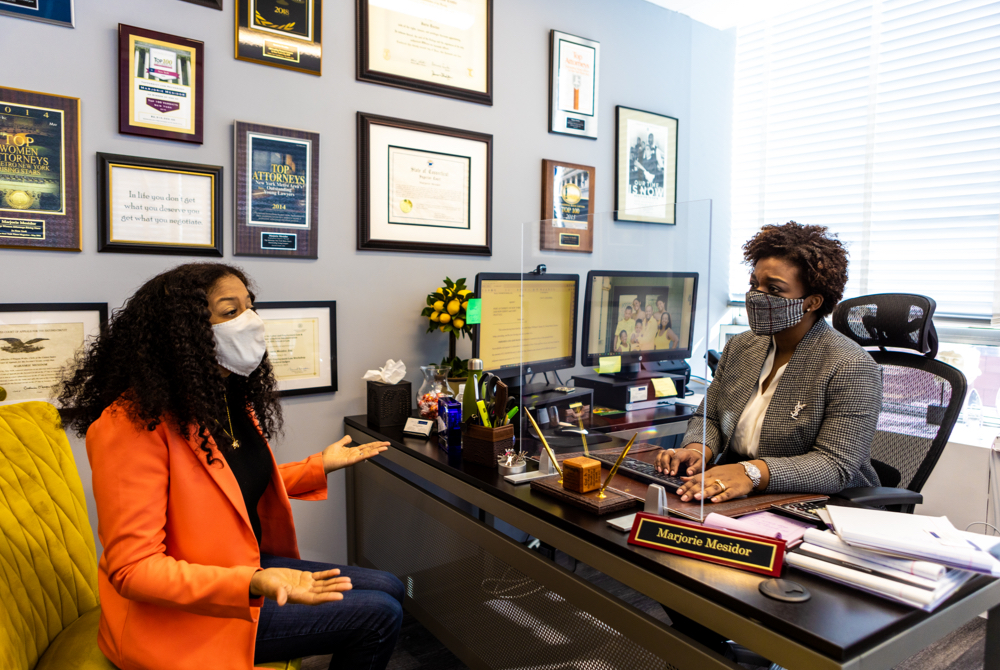Fighting Against Discrimination
In the Harsh World of Employment Discrimination Law, Touro Law Alumna Marjorie Mesidor Fights for the Marginalized

Striding into court, Marjorie Mesidor is every bit a natural lawyer. Whether she’s demolishing the other counsel’s argument, deconstructing a hostile witness, or acting as a fierce defender of the aggrieved who come to her seeking help, Mesidor is a force to be reckoned with.
“The highest compliment I ever received was from an opposing counsel,” recalled Mesidor. “After the case was decided in our favor, the counsel came over to me and said they would call me if they ever needed representation in an employment discrimination case.”
As a partner in Phillips & Associates, a premier employment discrimination law firm, Mesidor takes on cases of those who have been sexually harassed or discriminated against because of their protected characteristics like race, gender, sexual orientation, age, religion or disability. Due to the low rate of success of employment discrimination cases in federal court, most employment lawyers refuse the more complex and nuanced cases that end up on Mesidor’s docket. Successfully defying the odds and standing up against large corporations is where this Touro Law alumna thrives. And Mesidor, who has been ranked as one of the top 100 Civil Plaintiff lawyers and has a Top 50 Employment Discrimination verdicts and has earned her clients more than $40 million in settlements, credits Touro with seeing her potential.
An Insult That Launched a Career
Like every superhero, Mesidor has an origin story. As a young girl, Mesidor, whose family hails from Haiti, witnessed discrimination firsthand from her schoolmates and adults, but one incident sticks in her mind. While her mother tried to return an item in a department store—and though her mother spoke perfect English—a smirking cashier asked Marjorie’s mother to repeat herself over and over again.
I wanted to become a lawyer because I hate bullies.
“It was in a very demeaning and very disrespectful way,” recalled Mesidor. “I can remember being at that age, watching this individual humiliate my mom in a way and it had a very strong impact on me.”
Eventually, Mesidor, still a child, interceded. “I told the woman that it wasn’t that she couldn’t understand my mother, but that she didn’t want to.”
On the way home, Marjorie’s mother half-jokingly told her that she knew she had her “lawyer by her side.”
Years later, reflecting on the transformative experience, Mesidor explained, “It was a very proud moment for me. I was able to give my mother a voice when she didn’t have one.”
A Chance in Touro Law School

Mesidor excelled in high school and college and earned a BA in International Relations and Economics from the Franklin University in Switzerland. Thinking she was destined for law school, Mesidor took the LSATs, but her scores were mediocre. A second try, though much better, didn’t do enough to improve her average.
“I thought that the scores were indicative of my chances at law school and passing the bar,” said Mesidor. “Law school is a big investment.”
She decided instead to become a junior analyst at a large financial services company. After several months at the company, Mesidor was disheartened by her work. A mentor’s inexplicable firing was the final straw.
“It was so arbitrary and capricious.”
Thinking about that incident in the department store from long ago, Mesidor put in an application to Touro’s Jacob D. Fuchsberg Law Center in 2001. “Touro is the first school I can say that looked at each student holistically, instead of just their LSAT score,” she said. Looking beyond the numbers, Touro Law saw Mesidor, and her potential. By the end of August Mesidor was sitting in her first Touro Law class and on her way from investment banker to attorney.
A Natural Litigator
Mesidor initially planned to become an entertainment lawyer, but those plans were shelved after she began a class on contracts with Professor Beverly McQueary Smith. “Professor Smith told me that becoming an entertainment lawyer would be a waste of my talents,” laughed Mesidor. “She told me I was a born litigator and saw the litigator in me before I did. Things like that stay with you.”
A subsequent class in constitutional law with Professor Eileen Kaufman built on this new direction, demonstrating to Mesidor how she could use the law to impact the lives of people in her community.
“They reminded me of my why,” said Mesidor. “I wanted to become a lawyer because I hate bullies. I don't like the imbalance of power. I don't like circumstances where entire systems or organizations or anything are pegged to the advantage of one demographic versus the other. I don’t believe an individual should be treated wrongly just because no one can stop them. Fairness and balance are important to me—not only as an attorney, but also as an American. The American system only works when it’s balanced and everyone gets a fair shot.”
Mesidor also credited her mock trial classes for preparing her for the real world. “My professors walked me through trials,” she said. “It’s a beautiful thing: how Touro harvests and guides its students. My professors told me I had great witness control and my classes and experiences in Touro made me fearless.”
A Career with a Mission

After graduating, Mesidor clerked for the Honorable Torkwasé Y. Sekou, J.S.C., a member of New Jersey’s Supreme Court. Afterward she worked as an attorney at Paul, Weiss, Rifkind, Wharton & Garrison, LLP, a top-tier law firm in New York City. After three years, Mesidor joined the firm of civil rights legend Fred Brewington, a trial attorney with whom she externed in law school. There she found her footing and began working on employment discrimination cases. In 2011, she joined Phillips and Associates as an associate and five years later was made partner. In 2018, Mesidor opened Phillips and Associates’ Long Island office with just one associate. Today she manages a thriving office of 11 almost half of whom are Touro alumnae.
Employment law is a notoriously difficult field of law. Sixty percent of employment law cases are met with dismissal and roughly half of employment law cases end up decided in the defendant’s favor. Less than 25 percent of employment discrimination cases end with a verdict over 100K, making most cases unprofitable for lawyers. Mesidor has had a striking success rate, winning nearly 80 percent of her cases with all verdicts over 100K. She attributes this to her training at Touro.
“At Touro what was stressed was the value of showing up: early, well-prepared, well-dressed, and above and beyond what is required,” stated Mesidor. “That is the way to leave a lasting and great impression on not only your judges, but also your adversaries.”
“I'm known to show up in my first court appearance, not only knowing my case cold, but knowing exactly the number of damages that have been lost to date. I have the HIPAAs ready. I already have discovery requests ready to serve; everything is pre-done. At the end of that conference, the case automatically begins. That is the approach that was poured into me. My opponents don’t see me coming.”
Her success rate is also fueled by the moral indignation she feels at the plight of her clients. Mesidor has represented patients who have been sexually molested by their doctors, employees who have been fired or held back because of their race, and retail customers who have been accused of stealing because of their ethnicities. Unlike some employment discrimination firms which bill hourly, Mesidor works on a contingency basis.
“70 percent of Americans live paycheck to paycheck,” said Mesidor. “That means they’re one paycheck from being out the door. We are not going to ask an individual who just lost their job and doesn't know how they're going to pay their kids' tuition to give me $10,000 for us to take on their claim. No, we are going to let them know that we are going to take the risk with them. If we don’t deliver, then we get nothing. It's really just a very deep and fundamental understanding of the impact that law can have on an individual.”
What Touro Grads Have
Mesidor has hired four Touro Law Center alumni for her firm. She sees herself in them. “Touro grads have grit,” she said. “They make it happen. They’re creative and good on their feet. They don’t overintellectualize; they simplify. They cut through red tape and make things clear.”
Mesidor said she and her fellow lawyers are witnessing a sea-change in employment discrimination law, where the law is expanding to fit the larger American culture.
“For a very long-time employee discrimination was still centered around the N-word and burning crosses,” said Mesidor. “There's a lot of discrimination that happens well beyond the N-word and burning crosses that is still discrimination. For example, the idea that we now have a law that states that women of color can wear their hair in natural states is an incredible leap forward for the law. The law is catching up to what the world knows is discrimination.”
And as the law moves forward, Touro grads like Mesidor lead the way.